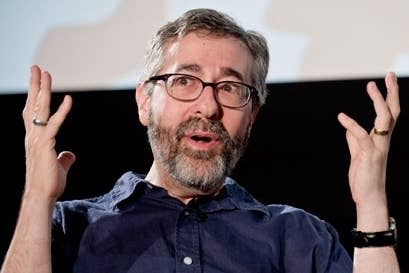Warren Spector: Where's Gaming's Roger Ebert?
In his latest column, Spector argues that the industry will be legitimized if mainstream publications can offer regular critical analysis of games
After my last column, I guess you could say, "Enough's enough. Move on to other topics," but I can't stop thinking about one aspect of the column - the idea of what constitutes appropriate games criticism (or, let's just say, something different in addition to what we have now). I promise I'll move on to another topic in the future, but for now, I hope you'll bear with me.
I think everyone can agree that gaming has plenty of consumer-oriented criticism along the lines of "It's great" or "It sucks." Sometimes, though not often enough, writers even share the reasoning behind their opinions. In this journalistic world, the quality of games journalism reminds me of what you used to see in amateur science fiction, comic book and movie fanzines in the days before newsstands were stocked with pop culture coverage. But at least we have some commercial, review-oriented cinema of varying quality.
Similarly, we have some - a growing amount - of academic games criticism. This circulates largely, even exclusively among (surprise!) academics, and most gamers, developers and publishers would be surprised to learn it exists, let alone find any sort of guidance or even utility in it.
Finally, we have a good bit of developer- or publisher-related writing, describing advanced techniques for making games, getting pixels on the screen, AI doing what we want it to do or getting games to market. There's no shortage of this sort, an unassailably good thing. Developers and publishers talking to each other, sharing knowledge and comparing notes? The more of that, the better.
So, we have critical writing and videos and teachers capable of reaching gamers, academics as well as developers and business people. Anyone notice a constituency that's missing here?
Yep.
Normal people.
Not gamers. Not professors. Not game-makers. Normal people.
In other words, we're missing much criticism or historical analysis that might speed up a process of achieving cultural acceptance of games as something more than a way to pluck dollars from the pockets of teenage and 20-something boys or the purses of 30-something women.
"To reach the parents, the teachers, the politicians, we need to be where they shop. Even if you never pick up a film magazine, the fact that there are obviously serious magazines devoted to the topic makes a difference in the minds of the uninitiated"
(Note: Before anyone accuses me of sexism, let me say I'm simply acknowledging the shameless sexism of the gaming world as it exists today. Call it a mini-column within the column. A two-fer, if you will. Don't kill the messenger.)
What we need, as I said in an earlier column, is our own Andrew Sarris, Leonard Maltin, Pauline Kael, Judith Crist, Manny Farber, David Thomson, or Roger Ebert. We need people in mainstream media who are willing to fight with each other (not literally, of course) about how games work, how they reflect and affect culture, how we judge them as art as well as entertainment. We need people who want to explain games, individually and generically, as much as they want to judge them. We need what might be called mainstream critical theorists.
And they need a home. Not only on the Internet (though we need them there, too), not just for sale at GDC, but on newsstands and bookstore shelves - our own Film Comment, Sight and Sound, Cahiers du Cinema. Magazines you could buy on the newsstand. Why? Because currently, criticism of this - what little we have of it - reaches only the already converted. To reach the parents, the teachers, the politicians, we need to be where they shop. Even if you never pick up a film magazine, the fact that there are obviously serious magazines devoted to the topic makes a difference in the minds of the uninitiated.
Equally important, we need everyday, mainstream media to devote space to different kinds of games coverage. Criticism, not just reviews. What comes to mind is the way the NY Times, the Village Voice, The New Yorker and others treat films.
Check out the June 23rd issue of the NY Times Arts & Leisure section. There you'll find articles of the sort that appear in the Times (and other print and online publications) day after day, week after week. When the topic is film, such articles are expected.
For starters, there's an article about Ernst Lubitsch (look him up) that describes and contextualizes his work. There's a piece on Alfred Hitchcock and how his lesser-known, relatively primitive silent films set the stage for later masterworks. These articles meld criticism and history to provide a context for thinking about movies old and new, not just the specific films and filmmakers they discuss. Articles like this can inspire viewers to think about all the movies they see in new ways. Moviegoers can enjoy the films discussed - or any film - just for what they are, but read enough such articles and it will inform and change the way you think. And that may change the kinds of movies you choose to see as well as how you think about them when you do.
Even better than Lubitsch and Hitchcock, there's a story called "Marriage, the Job" that discusses the ways in which a variety of movies reflect current (changing) attitudes toward marriage. Without assessing the quality of the article or discussing the "appropriate" attitude toward marriage, I'll just say this is a piece of writing that doesn't address or care whether the movies discussed are good or bad, or how they work from a formal, ludological manner. The article is simply about how movies work as cultural objects - not a simple subject at all - in a voice that's well suited to average (okay, maybe above average) readers with even a casual interest in films. It whispers, gently, "Look at me. I'm a serious medium. I'm worthy of your time and attention."
One listening to these whispers might be inspired to seek out some or all of the films discussed, but that isn't the fundamental point. These articles, all of them, in a single day's Times, aren't about how good or bad these movies are - they're about what these movies are about and how they go about being what they're about. These articles don't deny the commercial and business aspects of any film, but they choose to ignore or minimize these elements in a search for meaning and how meaning is communicated. These articles are about understanding, about authorial point of view, about the historical context in which a film came to be made and how films old and new can be relevant to us today.
In other words, these writers, seemingly, couldn't care less whether readers learn if they think a movie is good or bad. Their goal (again, seemingly, since I haven't asked any of them and wouldn't really care what their answer might be) is to communicate that, in some way, a film or director is worth writing and thinking about - certainly worth it for the critic and, one hopes, for the reader as well.
"Frankly, if games are not up to this sort of critical analysis then maybe they are just a way to provide some thrills and chills or some time away from real world problems"
Now, before anyone goes and gets their shorts in a knot, I know I've overstated a bit to make my case about the current state of games criticism. We do have some people - not enough, but some - trying to provide a criticism of explanation rather than a criticism of evaluation, the sort of criticism I've been talking about so far.
Stephen Totilo's work in the New York Times and elsewhere is definitely a step in the right direction. Leigh Alexander, Tom Bissell and Harold Goldberg have done some nice work in books aimed at a mainstream audience. Academicians like James Paul Gee, Henry Jenkins and Ian Bogost bring a level of erudition and depth of thinking we desperately need. (And remember, it's criticism, not history, I'm talking about. I could add several people to the list by including historical overviews to the discussion. Maybe another column, since there are issues with the way I see our history being written, too.)
And there have been some - way too few - outlets for games criticism in the "core" gaming world that go beyond reviews of varying quality. Back in the day, Next Gen magazine occasionally hit some heights, especially, I think, when Tom Russo was editing it. Nowadays, Edge fills that role on occasion. And there are some websites beginning to publish interesting work (but I'm still digging into those so I won't name names).
But for all those exceptions - and I'm sure I've offended countless other exceptional critics by not mentioning them in the list above (for which I apologize) - none have quite broken through to the mainstream consciousness. What's needed is a variety of ongoing, consistently publishing homes for critical thought. A book here, a book there... the occasional article in the New York Times... one magazine aimed at gamers... That isn't going to cut it.
I'm not saying reaching an audience that doesn't know enough to take games seriously will be easy. I'm for sure not finding fault with people currently trying to accomplish this difficult goal. I'm just saying we need to continue working and harder to bring more writers and thinkers into the area between Reviewers and Academia. We can't be complacent and say, "Aw, what we got is good enough."
Let's inundate the bookshelves, magazine sections and the web with work that isn't above (or below) the heads of readers. Only in that way will we achieve the level of respect I believe we deserve. Only in that way will we create an audience more demanding of the medium, which will inevitably lead to different and, I'd argue, better games.
This kind of treatment - as exemplified by the Times articles mentioned above - would do games a world of good. Establishing games in the public mind as something good and worthy and serious, and not just "fun for kids, but not for me" seems important to me. It's important to developers, publishers, players and maybe even to - for want of a better word - enemies who might come to a more nuanced understanding of our medium.
Frankly, if games are not up to this sort of critical analysis then maybe they are just a way to provide some thrills and chills or some time away from real world problems, as our critics (in still another sense of the word) contend.
One last thing before I call this column done. It's important to note that I used popular film criticism as my primary example here for two simple reasons:
First, because I'm an old movie buff with an academic background that leads me to value certain things. I could just as easily have cited examples from the worlds of books, music, theater, fine arts, architecture and more.
Second, because the New York Times does this every week. "Serious" film magazines do it every month. There's a continuity of outlook and style among the Times critics and others that I can count on. And even if you find their outlook doesn't match yours, the regularity of coverage speaks eloquently to the importance of the film medium even to those who don't read the articles.
To my mind, games are the only medium (well, maybe other than radio, at least post-1950s) that lacks some sort of serious, regular, mainstream critical tradition. And that, my friends, has to change.









